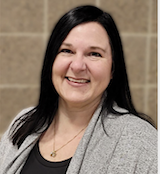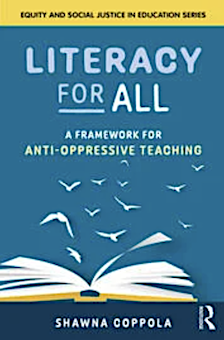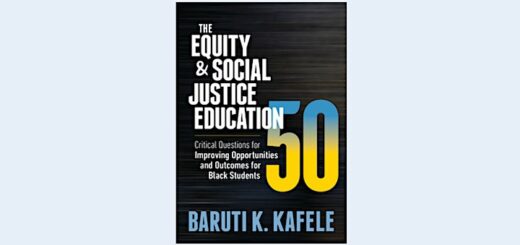Literacy Instruction Can Promote Social Justice
Literacy for All: A Framework for Anti-Oppressive Teaching
By Shawna Coppola
(Routledge, 2024 – Learn more)
Reviewed by Melinda Stewart

The book begins by challenging traditional notions of literacy and unveils a compelling argument for adopting an anti-oppressive approach in teaching. Coppola adeptly navigates through complex theoretical concepts while grounding her insights in practical applications, making the book accessible and relevant for educators (and administrators) at all levels.
Identities as assets, not obstacles

Highlighting celebration and obstacles, Coppola shares her own literacy journey with readers, which is both vulnerable and powerful. Throughout the book, we bear witness to the impact that numerous literacy and equity researchers and practitioners have had on her trajectory. Coppola’s reflections and reconsiderations invite us to get to know some of her influences as well partake in our own journey of reflection.
In the name of transparency, from the first pages I was drawn in. Before Coppola had even mentioned Lisa Delpit, my reader’s mind was making connections. I remember reading Other People’s Children very early in my career, but as a language teacher, when I read Delpit’s The Skin That We Speak, it was transformative.
Coppola’s Literacy for All: A Framework for Anti-Oppressive Teaching will be that transformative work for some. It is a call to action, both internal and external, and a reminder that our identities and thoughts evolve as we learn and critically reflect. (I am purchasing this book for a couple of colleagues because I need to reflect and collaborate. This can’t be a book I simply place on my shelf or keep to myself.)
Educators as agents of change
The book challenges educators to confront systemic inequities within educational institutions and advocate for transformative change. Coppola’s call to action is powerful, urging educators to become agents of change in dismantling oppressive structures and fostering environments where all students can thrive academically and personally. As difficult as it may be, we must acknowledge the harm that has been and continues to be inflicted on students and our role in it.
Coppola’s framework provides a wealth of practical strategies that illustrate how educators can advocate for and create anti-oppressive learning environments. From inclusive literacy practices to critical literacy approaches, each strategy is meticulously explained and accompanied by reflection questions that encourage educators to interrogate their own biases and assumptions. She advocates for strategies that look to banishing a deficit mindset and empowering students to make meaningful decisions about not just their reading and writing, but all of their literacy practices.
An intersectional approach
The greatest strength (and there are many) of Literacy for All: A Framework for Anti-Oppressive Teaching lies in its intersectional approach to literacy instruction. Coppola addresses how race, ethnicity, gender, socio-economic status, and other facets of identity intersect and impact students’ experiences in the classroom. This holistic perspective is crucial for developing comprehensive strategies that meet the diverse needs of students from marginalized and underrepresented backgrounds.
Shawna Coppola’s expertise and passion for social justice shine through in every chapter of Literacy for All: A Framework for Anti-Oppressive Teaching, offering a roadmap for creating empowering learning environments where all students feel seen, heard and valued.
Read Shawna Coppola’s MiddleWeb article:
Our Students Need a New Definition of Writing
Melinda Stewart has been an educator for 30 years. She has an MA in Teaching, Education and Learning and has done graduate work in the areas of English as a Second Language, Reading, Spanish, and most recently English Language Arts. She is currently working as a Spanish teacher and ELM coach at Fairmont (MN) Junior Senior High School. Melinda is an MEA and AFT professional development facilitator and trainer who has a deep passion for learning and equity.



































